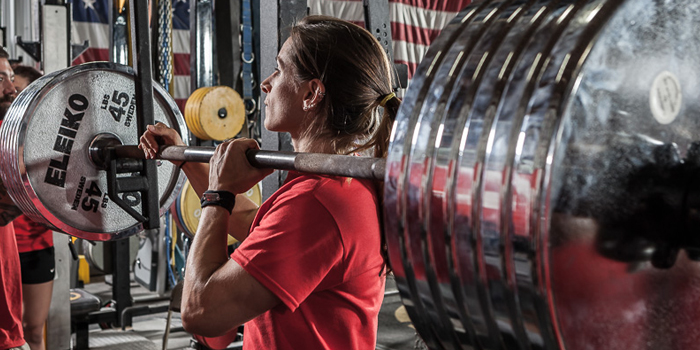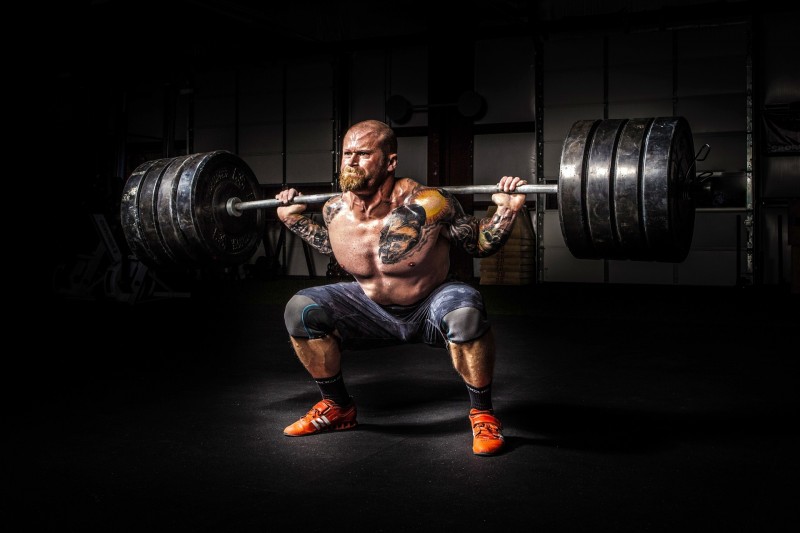
We’ve all been drawn to strength training for different reasons. The reasons range from stress relief and improving self-confidence, to a competitive replacement for college athletics, to a desire to set a World Record (and everything in between).
No matter what brought you to a loaded barbell, it doesn’t take long to see that training to your full potential is no easy task. What the iron gives in strength, self-confidence, and accomplishment, it requires an equal (or greater) share of effort, perseverance, and dedication. For those that choose to make training a priority in their lives, it’s worth the time and effort we dedicate to it. For many of us, however, the barbell isn’t the only weight being carried on a daily basis.
Mental health and mental illness aren’t terms you probably hear often in the strength world, but it’s certainly not because mental illness isn’t common among strength athletes, or athletes in general. A systematic research study of over 2,000 scholarly articles in 2015 concluded that while the evidence base regarding mental health and well-being of athletes is limited by a lack of research, the existing research does show that the population is vulnerable to a range of mental health problems which can be related to both training and non-training related factors.1 Dr. Charlie Maher, Sport and Performance Psychologist for the Cleveland Indians (as well as psychiatric consultant for several other pro sports teams), has worked with elite-level athletes for over 30 years and agrees that empirical research on this topic is lacking. He said that while the rate of mental illness in athletes is comparable (and even higher at the college level) to that of the general population, a reluctance to seek help because of stigma and a view of “mental illness as weakness,” can make providing the needed resources for these athletes difficult.7 Strength athletes in the powerlifting world deal with some of the same stigmas as these pro athletes. Jeff Frank, a Pro Powerlifter and founder of Strength Over Suicide (S.O.S.), notes that “a very high percentage of athletes I have met, at least in the powerlifting realm, all have some sort of story [as it relates to mental illness]. Some not as dark as others, and I think that goes for the general population as well. Again it's not something a lot of people talk about, or are willing to admit.”8
RELATED: "It WILL Pay Off": A Message for Those Struggling with Mental Illness
Dr. Lisa Lewis, a licensed psychologist who earned her doctorate with a specialization in Sports Psychology from Boston University, notes that many of the characteristics that draw people to strength sports (and even help them excel), can put those same athletes at risk for mental health conditions: “Athletes are typically high-achievers. They're driven, and organized, and focused, and at higher levels of performance/competition, that can cause worry, tension, anxiety, irritability, and unhappiness in the best of us! So I do think that folks who are under great pressure to perform and are also taxing their bodies and their daily schedules are more vulnerable to mental health symptoms. In addition, sometimes it's important to consider the personality type of a high-achiever, particularly in a sport that is extremely precise. In other words, if a person already has perfectionist tendencies, then that will be exasperated by the sport. In some respects, it's very helpful, but in others it can cause issues.”9
As we look at the numbers, research, and expert opinions, it’s becoming clear that general perception and actual reality aren’t quite the same thing when it comes to the number of strength athletes dealing with mental illness. When I dealt with my own severe anxiety and depression for years, I found myself consistently feeling alone and like I was “the only one who can’t handle normal life” (i.e. this is my fault for not being strong enough). During those years I struggled with insomnia and dependency on alcohol, and saw my work, training, and relationships suffer because of the seemingly source-less panic that gripped me on a daily basis because of my anxiety. Even though I met with counselors and in my head I knew that the nervousness and depression wasn’t all because of some deep character flaw, there were always times I felt like I was less of a person (and less of a competitor) because of what I was dealing with.
Particularly in a sport like powerlifting where performance isn’t linear (you aren’t hitting PRs every day), it’s very easy to see poor performance in the gym or on the platform as just more evidence of “weakness." This aligns with the research that has shown that “athletes may be even more susceptible to underdiagnosis and inadequate treatment of depression and other mental illness than are non-athletes, particularly for problems that are related to athletic training and performance.”2 When we struggle, we’re always used to thinking “what’s the weak point?” and assuming it’s purely physical, and often times don’t realize it can be psychological and even relate to a legitimate mental health condition.
Despite some of this proven research that does exist, resources for strength athletes still aren’t easy to find. It wasn’t until I wrote this log post about my own personal struggles (and my recent improvement after years of dead ends), and created an anonymous survey for lifters who deal with mental health conditions that the response made me start to realize just how many strength athletes struggle in this area. Following the post regarding my own story, I received over 50 emails from people dealing with similar issues, and in just a few short days of posting my Mental Health and Strength Training Survey I had 123 lifters complete it.
RELATED: How Powerlifting Saved My Life
The responses were diverse, but there was a recurring theme of lifters feeling as though they were alone in their situation or were less of a competitor because of what they were dealing with. These 123 lifters dealt with a variety of mental illnesses including Depression (82%), Anxiety (70%), and Bipolar Disorder (14%), as well as other conditions such as schizophrenia, ADHD, PTSD, and Eating Disorders.4 For those unfamiliar with mental health conditions, it’s important to note that when we speak of things like depression and anxiety in this context, we aren’t referring to just having a bad day once in awhile or worrying about a stressful life event. We all have tough days, but something like Clinical Depression is a mental health condition in which depressive symptoms such as sadness, loss, anger, and frustration consistently interfere with daily life for weeks or longer.3 This is important to understand because too often does someone dealing with Depression hear things like “you just need to be happier” from people who don’t understand all the factors that need to be addressed (which we will go into more later).
I discussed some of these statistics with Dr. Eric Serrano, who is one of the leading experts in the country on sports nutrition, blood analysis, and injury prevention. He provides medical care for a huge list of the top powerlifters and bodybuilders in the world. He also noted that depression is an incredibly prevalent condition with powerlifters, and affects about 80% of the lifters he works with.5 He also noted that the prevalence of mental illness in bodybuilders he works with is even higher, because of instances of body dysmorphia (anxiety about a distorted self-view of one’s body) and the aesthetic focus of the sport. Dr. Serrano also noted that while many lifters have pre-existing mental health conditions when they enter the sport, additional in-sport factors such as poor relationships/support system due to training priorities, steroid (and other drug) effects, overtraining, and lifestyle choices can worsen a lifter’s pre-existing mental illness. He approximated that 60-70% of the lifters he works with have been affected for the worse from these behaviors.5
Of course we also see the incredible benefit that strength training has for those dealing with mental illness. 85% of the lifters who took the Mental Health and Strength Training Survey said that training has had an overall positive effect on their mental health.4 The lifters who completed the survey noted that training provides benefits to them such as:
- Provides consistency and a sense of direction in their otherwise hectic life
- Helps them to stay focused on things other than anxiety
- Provides an outlet for nervous energy and built up stress
- Provides a sense of accomplishment
- Improves mood
- Decreases depressive symptoms
These benefits align with some of the research on exercise’s effects on mental health, including studies which have shown that “exercise improves mental health by reducing anxiety, depression, and negative mood and by improving self-esteem and cognitive function.”6
So now we’ve got ourselves a bulk of both anecdotal and peer-reviewed evidence that on one hand notes the incredible benefits of strength training, while on the other hand identifies an extremely high rate in mental illness for strength athletes. This is where the gap of research currently rests, as studies have yet to identify the “tipping point” when training can become too much of a good thing (although I’m starting to have my own suspicions based on patterns I’m seeing) and how strength athletes can best manage their mental health in accordance with their sport. This is why I decided to pursue researching this topic more, and am writing this series on Mental Health and The Strength Athlete. I know what it’s like to be struggling with seemingly no hope, and what it’s like to try and navigate improving my mental health while also keeping training a top priority. I remember how difficult it was for me to find resources for strength athletes, and my hope is to change that over the course of the next year.
RELATED: The Forgotten Power of Training
This is a project and a journey that is bigger than just this first article, but if you are dealing with a mental health condition (or just suspect you might be after reading through some of the symptoms), there are some immediate steps you can take right now to best support yourself. The scariest statistic that I found when looking at my survey was that 45% of lifters who were suffering from symptoms of a mental health condition had not attempted to be diagnosed or seek any care (whether through a counselor, doctor, therapist, etc).4 This isn’t surprising given the national statistics, which show nearly 60% of adults with a mental illness did not receive any care in the previous year.10 Everyone is different, and the treatments and methods for improving one’s mental health will vary from person to person, but there is no excuse not to attack the challenges just like any other. It took years of different therapists, doctors, friends, medications, and other means for me to finally find some relief for myself. There was plenty of trial and error along the way, but I am forever grateful that I didn’t give up. Dr. Lewis also reiterated the importance of facing these issues head on:
“Why not seek treatment? In my opinion, the biggest issue facing mental health right now is stigma. If you woke up and had a red itchy rash on your arm, you bet your ass you'd be calling your doctor! If you were running a fever for over a day and you couldn't eat or really sleep well, you'd ask for help. So what's the difference when the symptom is something emotional or cognitive? My pitch to my patients and clients is that there is no difference. Mental illness often goes untreated because people feel they are "being lazy" or "weak". But you'd never think that about yourself if you had strep throat, or a UTI.
Many types of mental health problems compel us to stay quiet, withdraw from our supports, and try to "handle it on our own". This is the #1 way to make the problem worse. Talk about what's going on. If you're not ready to see someone professionally, tell a friend or call a hotline. There's even online chat and text messaging resources out there. Your happiness is ESSENTIAL to having a healthy and successful life! We all have rough weeks or little ebbs and flows, but don't settle for feeling uncomfortable, unhappy, bent-out-of-shape, and/or "not yourself" for longer than 3-4 weeks.”9
The upcoming articles in this series will focus on the exact relationship between training habits and mental health, as well as programming and training considerations for those with mental health conditions. I will be drawing from peer-reviewed research and interviews with some of the top psychology experts in the country, my own experiences, and correspondence and survey data from various strength athletes all across the spectrum to provide as much information as I can for those looking for answers.
Whether you deal with a mental health condition yourself or not, becoming more educated on these topics will make give us all better understanding and help us be able to better support each other as we all strive to become Strong(er).
Helpful Resources
- National Alliance on Mental Illness: https://www.nami.org/#
- Project 375: Mental Health Advocacy (co-founded by NFL Wide Receiver Brandon Marshall): http://project375.org/
- Strength Over Suicide (S.O.S) Facebook Page: https://www.facebook.com/Strength-Over-Suicide-SoS-1037148352973435/?fref=ts
- National Suicide Lifeline: http://www.suicidepreventionlifeline.org/
References
- Rice, S. M., Purcell, R., Silva, S. D., Mawren, D., Mcgorry, P. D., & Parker, A. G. (2016). The Mental Health of Elite Athletes: A Narrative Systematic Review.Sports Med Sports Medicine. doi:10.1007/s40279-016-0492-
- Schwenk, T. L. (2000). The stigmatisation and denial of mental illness in athletes.British Journal of Sports Medicine, 34(1), 4-5. doi:10.1136/bjsm.34.1.4
- Major depression: MedlinePlus Medical Encyclopedia. (n.d.). Retrieved June 02, 2016, from https://www.nlm.nih.gov/medlineplus/ency/article/000945.htm
- Mental Health & Strength Training Survey. Created by Joe Schillero and distributed via social media and elitefts training log. All responses were anonymous, voluntary, and used for the purpose of education.
- Mental Health & Strength Training Interview with Dr. Eric Serrano [Telephone interview]. (2016, June 01).
- Exercise and Mental Health. (1987). doi:10.4324/9780203780749
- Mental Health & Strength Training Interview with Dr. Charlie Maher [Telephone interview]. (2016, June 01).
- Mental Health & Strength Training Interview with Pro Powerlifter Jeff Frank [E-mail interview]. (2016, June 02).
- Mental Health & Strength Training Interview with Dr. Lisa Lewis [E-mail interview]. (2016, June 02).
- Mental Health By the Numbers. (n.d.). Retrieved June 02, 2016, from https://www.nami.org/Learn-More/Mental-Health-By-the-Numbers













After all, look how much Duffin overcame and what an amazing specimen he now is. You, the lifter who isn’t as big as Duffin (who is?), obviously really must have something wrong with you if you can’t achieve his levels of “mental toughness.”
Elite would be well served by openly addressing this contradiction, and the obvious way to do that would be to have Chris Duffin actually acknowledge that he is literally and figuratively stigmatizing other athletes by demanding “mental toughness.” Your move, I’d say.
That being said, I know Chris discusses mental toughness quite often, and has overcome a lot himself. I personally have never taken anything Chris has said as meaning that if you aren't as his level it's because you aren't mentally tough enough (and from any time I've talked to Chris I am confident he doesn't think this either). I also don't believe being mentally tough and addressing mental health concerns are contradictory. If anything, I think it takes a lot of mental toughness to show the humility and commitment to address such a stigmatized topic. I think the key for many of us may be simply re-framing what we perceive when we hear terms such as mental toughness, and realize toughness can include persevering through mental and emotional concerns.
I assume you could talk to him personally and urge him to be much more clear about how much of the workings of the mind are one’s own damned fault for not being the army of one named Chris Duffin.
Your comments seem to take issue with Chris's statements much more than the content of this article. Rather than put Joe in a position to defend or explain Chris's views, why don't you contact Chris yourself, either through the elitefts q&a or elsewhere and get clarification from him?
Thank you for what you are doing, and I look forward to future pieces from you.
There are always going to be overly alpha male players in the lifting world - in some cases it's a marketing strategy to attract views. EFTS is full of larger than life lifters with diverse backgrounds and experiences - they are not all going to be the same - it's what makes this place the place it is.
Re: Joe Schillero
Looking forward to this series. As a bullied fat kid, injured soldier and now lifter - I often compare my progress to that of my peers and get pissy when my results aren't in the same ballpark. It will be nice to see how others get around the similar issues
RE: Joe Clark - Mental Illness and Mental Toughness have nothing to do with one another!!! People with mental illnesses like depression, bipolar disorder, schizophrenia have chemical imbalances in the neurotransmitters in their brain. They may be born with this condition or it may develop over time. There is absolutely nothing that can be done to anticipate or prevent many of these conditions, they can only be treated with correct medication regimes and psychotherapy. And even with that many patients are prone to relapse or changes in symptoms. Mental Toughness is a totally different animal. It is your attitude,intensity, discipline, determination, dedication and competitiveness. Mental toughness is you will to win!! It's what type of person are you; are you the athlete that pushes through the pain, battles to have a great workout even on a crappy day, or are you the person that goes home and cries to mommy!! Mental toughness is going years and never missing a workout, anyone can go 12-16 weeks and never miss, but can you for 4-5 years and never miss a workout?? Do you attack every rep, every set every workout like it's going to be your last. When your program only calls for 5 reps on your last set, do you say F*** that I'm getting 6 or 7 reps? Do you squat till you puke and then come back for more? That's Mental Toughness!!! Don't insult the millions of athletes out there that fight mental illnesses and display mental toughness on a day in and day out basis by absolutely busting their asses in the gym.
RE: Joe Clark - Mental Illness and Mental Toughness have nothing to do with each other!!! People with mental illnesses like depression, bipolar disorder, schizophrenia, ect. suffer from chemical imbalances in the neurotransmitters in their brain. They may be born with it or it could develop over time. There is nothing they can do to anticipate or prevent it. They can only be treated with medication regimes and psychotherapy. And even with proper treatment, many people will suffer with relapses and acute symptom breakthroughs.
"Mental Toughness" is a completely different animal. Mental Toughness is your Attitude, Intensity, Discipline, Determination, Dedication and Competitiveness. It your will to win!!! Even on a really crappy day, Mental Toughness is having the fortitude to show up and have a GREAT workout, not go home and cry to mommy. Mental toughness is attacking every rep, every set and every workout like its your last one ever. Mental toughness is having the dedication and discipline to go years without missing a workout. Anyone can go 12-16 weeks and never miss a workout, but can you go 4-5 years and never miss a workout? When your program calls for your last set to be ME 5 reps, mental toughness says F*** that I'm getting 6 or 7 reps!! Mental toughness is squatting till you puke, and then coming back for more!!! Mental toughness is what makes a good athlete become a great athlete!! There are millions of people out there that suffer from mental illnesses and many of them are fighting everyday to try to live normal successful lives, don't insult them by trying to compare mental illness to mental toughness.